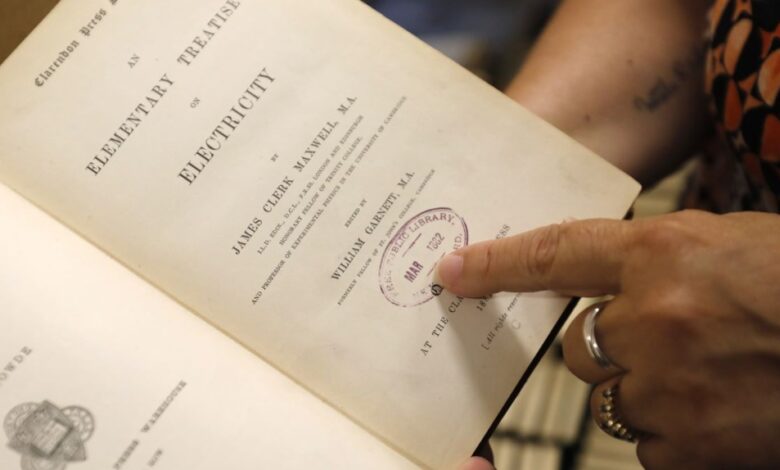Book returned to the library in Massachusetts 119 years later

BOSTON –
On February 14, 1904, someone curious about the emerging possibilities of a major force of nature viewed James Clerk Maxwell’s “An Elementary Treatise on Electricity” from the New Bedford Free Public Library.
It would take 119 years and the keen eyes of a West Virginia librarian before the scholarly text finally found its way back to the library in Massachusetts.
The discovery came as Stewart Plein, the curator of rare books at West Virginia University Libraries, was sorting through a recent donation of books.
Plein found the treatise and noticed that it was part of the collection of the New Bedford Library and, critically, had not been stamped “Withdrawn”, indicating that the book, while extremely late, had not been discarded.
Plein contacted Jodi Goodman, the librarian of the special collections in New Bedford, to inform her of the find.
“This came back in extremely good condition,” Olivia Melo, director of the New Bedford Public Library, said Friday. “Someone obviously kept this on a nice bookshelf because it was in such good condition and probably passed down the family.”
The treatise was first published in 1881, two years after Maxwell’s death in 1879, though the cranberry-colored copy now back in the New Bedford library is not considered a rare edition of the work, Melo said.
The library occasionally receives books as late as 10 or 15 years, but nowhere near a century or more, she said.
The paper was published at a time when the world was still trying to understand the possibilities of electricity. In 1880, Thomas Edison received a historic patent embodying the principles of his light bulb.
When the book last appeared in New Bedford, the country was preparing for its second modern World Series, incumbent Republican President Theodore Roosevelt was on track to win another term, Wilbur and Orville Wright had their first plane flight a year earlier made and New York City celebrated its first subway line.
The book’s discovery and return is a testament to the permanence of the printed word, especially in an age of automation and instant access to unfathomable amounts of information, Melo said.
“The value of the printed book is that it’s not digital, it’s not going to go away. Just holding it makes you feel like someone has this book 120 years ago and is reading it, and here it is in my hands,” she said. “It will still be here a hundred years from now. The printed book will always be valuable.”
The New Bedford Library has a five cent per day late fee. At that rate, someone returning a book 119 years late would have to pay a hefty fee of more than $2,100. The good news is that the library’s late fee limit is a maximum of $2.
Another lesson from the find, according to Melo? It’s never too late to return a library book.




